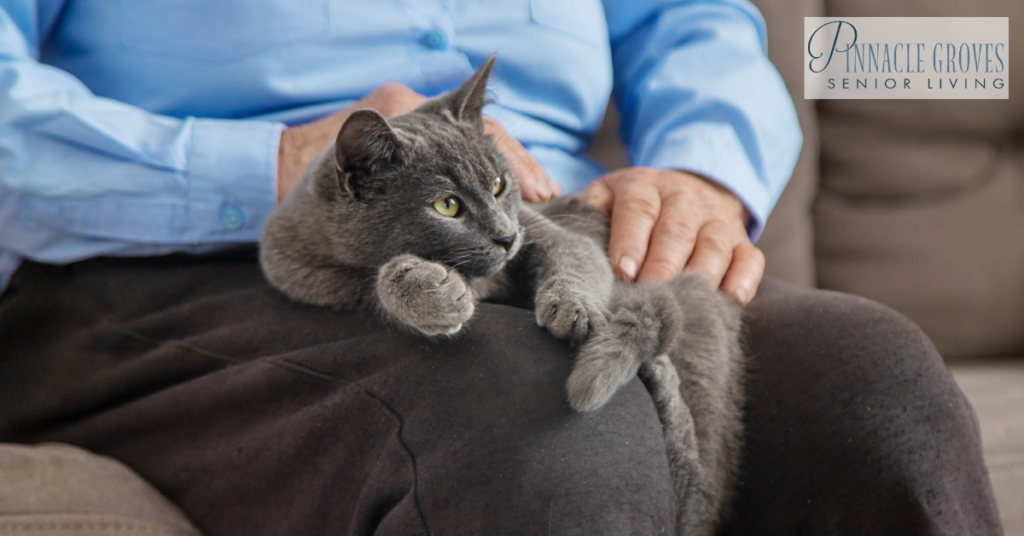Dehydration in seniors is a serious issue that can often go overlooked. When seniors don't get enough fluids, it can significantly affect their physical and cognitive health. As we age,...
Read more
The Benefits of Pet Therapy for Memory Care Residents

In recent years, pet therapy has gained widespread acceptance as a powerful form of emotional and cognitive support for seniors living in memory care communities. The benefits of pet therapy for seniors are catching on as more families seek out compassionate, enriching environments for their loved ones. Animals are vital companions for memory support settings, and they can help reduce anxiety in residents and enhance social connections among peers. Explore the comforting benefits of pet therapy for the elderly in memory care. These meaningful moments with pets can bring lasting joy, spark memories and support the emotional, cognitive and physical well-being of your loved one.
What is Pet Therapy?
Pet or animal-assisted therapy involves guided interactions between residents and highly trained animals. To ensure the experience is safe, these sessions are supervised by professionals or volunteers. Each pet visit is personally tailored to make your loved ones’ experience safe and meaningful while also being adapted to their specific needs.
Pet therapy can play an important role in enhancing the daily life of residents of memory care communities. The simple calming presence of an animal often brings smiles, peace and moments of recognition to those living with cognitive challenges.
Studies show that spending just 15 minutes with an animal initiates positive hormonal changes in the brain by dropping stress levels and increasing serotonin levels. Serotonin is known as the “happy chemical,” and boosting it leads to joy and contentment. Whether it’s a gentle dog laying its head on your loved one’s lap or a cat curling up next to them, animals offer a unique companionship that feels natural, comforting and familiar. These uplifting interactions can provide a welcome sense of spontaneity in the structured daily routine of seniors with dementia.
Types of Pet Therapy for the Elderly with Cognitive Decline
Several different forms of pet therapy for the elderly can be beneficial for those living in memory care. Choosing the right fit depends on the resident’s personal needs and the community’s approach. Each type of pet therapy offers varying levels of interaction and support to fit every situation.
Ownership Therapy
Ownership Therapy involves residents living full-time with their own pets. While this option does require a higher level of support and pre-planning within a secure community, it can be incredibly rewarding for residents. The constant loving presence of a cherished pet provides companionship, routine and a strong emotional bond. Consistent interaction with a pet nurtures a sense of purpose and responsibility and is one of the many benefits of pet therapy for seniors.
Visitation Therapy
Visitation Therapy is the most common form of pet therapy for older adults in senior living communities. This therapy involves trained therapy animals and their handlers visiting residents on a regular basis. These highly anticipated visits bring a sense of whimsy, joy, and calm to residents’ lives without the continuous responsibilities of pet ownership. Some of the many benefits of pet therapy for seniors in this format include reducing loneliness, improving mood and even encouraging gentle physical activity.
Animal-Assisted Therapy (AAT)
Animal-Assisted Therapy, or AAT, is a structured form of therapy guided by health or wellness professionals. The individual sessions are designed to help your loved one achieve specific goals. This pet therapy is integrated into the resident’s care plan and can help them improve motor skills, reduce agitation or enhance social interaction. These emotional and therapeutic benefits highlight the importance of integrating pet therapy into dementia care plans.
Emotional Benefits of Pet Therapy
One of the most powerful benefits of pet therapy is its amazing ability to foster positive emotional connections between pets and people. Residents in memory care often experience demoralizing feelings of isolation or frustration due to memory loss and communication difficulties. Interacting with a gentle, nonjudgmental animal friend can significantly lift their spirits and make them feel loved and fulfilled.
Simply petting or holding an animal can release endorphins and reduce stress hormones, promoting a sense of tranquility and happiness. Therapy animals are experts at offering unconditional affection, which is deeply comforting to seniors experiencing a loss of independence or adjusting to a new living arrangement. This emotional bond soothes residents and brings peace of mind to their families, who can rest assured that their loved ones feel valued and emotionally supported in their new home.
In a structured environment, where predictability and routine are key, animal visits offer spontaneous joy and a sense of familiarity. For residents who may no longer remember the names of friends or care partners, the consistent presence of a furry companion can become a lasting anchor in their day-to-day lives.
Cognitive Benefits of Pet Therapy
The benefits of pet therapy go beyond emotional comfort. Pet therapy also offers meaningful cognitive stimulation for residents in memory care. This mental engagement is vital and helps promote increased focus, interaction and may even improve memory recall.
When residents interact with therapy animals, they often recall positive stories of past pets, childhood memories or beloved family experiences. This simple act of reminiscing stimulates neural pathways and promotes conversational abilities in seniors with dementia.
Additionally, structured tasks like brushing a dog’s fur or giving them a tasty treat require focus, sequencing and gentle motor planning. Preserving these skills as long as possible is an important focus in memory support communities. While these small tasks may seem simple, they represent significant steps in reinforcing routine and creating a sense of purpose.
Another mental health benefit of pet therapy is improved attention span and alertness. While interacting with animals, residents often become more responsive and engaged during and after their therapy sessions, enhancing their community participation.

Physical and Social Benefits of Pet Therapy
Increased physical activity is another one of the many benefits of pet therapy. For many memory care residents, mobility and coordination can begin to decline with age. Pet therapy encourages your loved one to enjoy gentle movement like walking with a small dog, tossing a toy or simply rubbing a dog’s belly. These fun activities help improve circulation, muscle tone and joint flexibility in seniors with dementia.
When residents are brushing a cat, fastening a collar or feeding treats by hand, they are also maintaining their fine motor skills. These small yet purposeful motions support hand-eye coordination and dexterity.
Beyond individual interaction, pet therapy often encourages communal engagement. When therapy animals visit a memory care community, residents gather together, share stories and observe one another’s interactions. This naturally encourages communication, laughter and connection, which is an essential component of emotional and social well-being.
The benefits of pet therapy aren’t just for the residents; they also extend to care partners and staff. The presence of animals creates a relaxed, joyful atmosphere that everyone in the community can enjoy. Maintaining an upbeat living space makes it easier for care teams to interact with residents in a positive and supportive manner. Pet therapy can even help build trust between residents and their care partners, improving the overall dynamic in the community.
A Pet-Friendly Approach to Memory Care at Pinnacle Groves
Understanding the benefits of pet therapy helps care partners and family members appreciate its role in comprehensive memory care plans. The emotional support provided by animals contributes significantly to the overall well-being of the elderly in memory care communities. By cultivating memorable interactions between pets and seniors, care partners help residents feel connected, seen and emotionally uplifted.
At Pinnacle Groves, a pet-friendly senior living community in Rogers, Arkansas, we understand the importance of the comfort and companionship that animals can bring to those living in memory care. While every individual’s journey with memory loss is unique, a pet’s loving presence can create meaningful moments of joy, connection and calm. Many families exploring memory care options are also learning more about the benefits of pet therapy. These benefits include reduced stress, improved mood and enhanced social interaction for their loved one.
If you’re considering memory care options for someone close to you, we invite you to learn more about life at Pinnacle Groves. Schedule a personal tour today to explore our welcoming community and see how a pet-friendly environment can support elevated comfort, connection and holistic care for your loved one.
Related Posts
Embarking on the journey of caring for a loved one with dementia is filled with both meaningful moments and emotional challenges. As your loved one's dementia progresses, they may begin...
Read moreThe onset of memory loss or cognitive decline is a common symptom many people experience as they age. Finding a supportive environment is essential for seniors living with Alzheimer's, dementia...
Read moreRecent Posts
Related Posts
Dehydration in seniors is a serious issue that can often go overlooked. When seniors don't get enough fluids, it can significantly affect their physical and cognitive health. As we age,...
Read moreEmbarking on the journey of caring for a loved one with dementia is filled with both meaningful moments and emotional challenges. As your loved one's dementia progresses, they may begin...
Read moreThe onset of memory loss or cognitive decline is a common symptom many people experience as they age. Finding a supportive environment is essential for seniors living with Alzheimer's, dementia...
Read more



